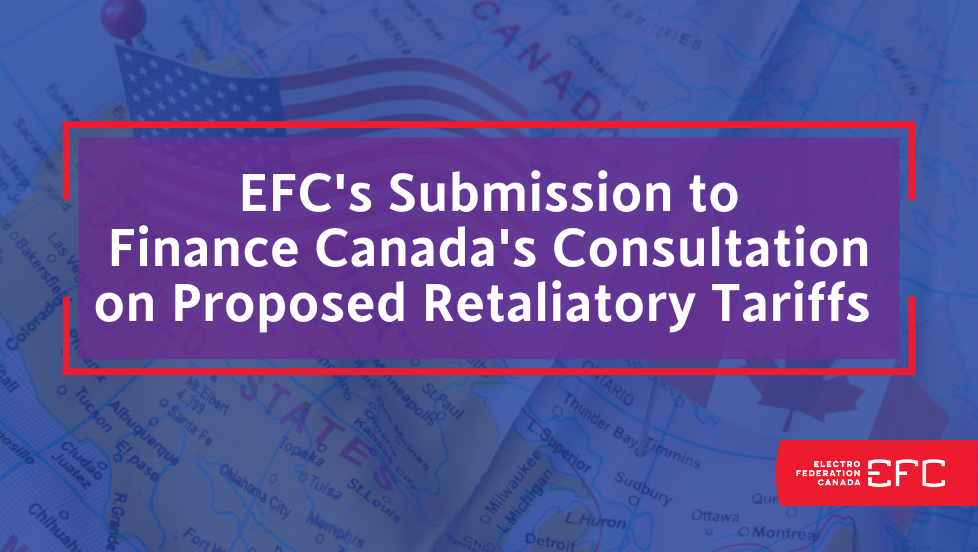A Fair-Trade Approach to Protect Canadian Businesses and Jobs

EFC continues to advocate our government fight for free trade for the electrical and automation industry. An exemption for electrical products is in both countries’ energy security and economic interest. However, if Canada is unable to secure an exemption for electrical products, EFC board members came to an agreement that Canada should take a fair-trade approach to protect Canadian businesses and jobs by applying retaliatory tariffs to all U.S. electrical products unless no alternate supplies are available in Canada. Matching tariffs product by product will level the playing field for companies.
EFC submitted our industry position to Finance Canada on Friday, February 28, 2025 along with an initial list of electrical and automation HS codes. View letter.
Finance Canada opened a consultation on proposed retaliatory tariffs ending April 2, 2025 (extended from March 25). EFC staff have consulted Business Section member companies to confirm the HS codes relevant to EFC member products. EFC has submitted a revised list of HS codes reiterating EFC’s position free trade first, fair trade as a response to imposed tariffs from the United States. This updated list covers HS codes that EFC members would like retaliatory tariffs applied to and HS codes EFC members would like to see excluded from retaliatory tariffs. To ensure impartiality, EFC staff developed categories when deciding which HS codes would be included and which HS codes should be excluded from retaliatory tariffs imposed by Canada.
To meet the objective of fair trade, HS codes included on the list needed to meet the following criteria:
- Substantial domestic manufacturing.
- Manufactured by EFC Members.
- Readily available alternatives are supplied outside the U.S.
EFC has also included a list of HS codes that should be exempted from Canada’s suite of retaliatory tariffs. These items are essential components within the electrical and automation supply chain, and there are currently no viable alternative supply of these products within Canada or through other trading partners that can meet the necessary specifications, quality standards, and volume requirements. Without access to these critical products, Canadian electrical and automation manufacturers will face significant production delays, increased costs, and potential shutdowns, severely undermining their ability to remain competitive in North American and global markets.
HS Codes that were excluded or removed from the list met the following criteria:
- HS codes not manufactured by EFC Members.
- No alternative, or minimal alternative supply, outside the U.S.
- Would only increase costs with no fair-trade benefits.
The Canadian government communicated the intention to avoid tariffing component parts. EFC removed HS codes that met the following criteria:
- Component parts that would increase the cost of manufactured finished goods in Canada.
EFC continues to work with our members to mitigate the damage of U.S. tariffs to our electrical and automation industry. EFC is also working with our counterparts in the U.S. (NEMA) and Mexico (CANEME) to advocate the importance of free trade.
To keep members informed, EFC has created a centralized hub featuring the latest actions, advocacy efforts, and resources related to the ongoing tariff situation between Canada and the United States. Check back for updates, insights, and guidance to navigate evolving trade developments, industry impacts, and strategic responses. – View Tariff Update Hub